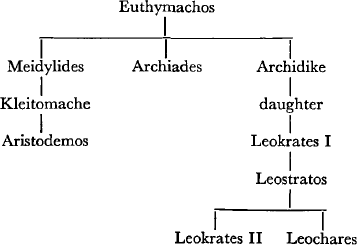Published online by Cambridge University Press: 18 September 2015
Some years ago M. Miller began an article in this Journal with the statement, ‘Classical Greek kinship terminology, as it is used for example by Isaios, offers few difficulties of meaning in its terms.’ She then constructed a chart to show the ‘principal usages’. A review of the evidence indicates that this chart was probably based on Pollux’ discussion of kinship terms; at any rate it simply does not reflect the actual usage of Attic prose writers (the ten orators, Thucydides, Xenophon, Plato). For example the chart shows that the terms for uncle are μήτρως (maternal uncle) and πάτρως (paternal uncle). Neither of these terms is used in Attic prose at all, and there is only one occurrence in Attic poetry: μήτρωσιν (dative plural) in Euripides, referring to a maternal grandfather (plural for the singular) or maternal ancestors in general. The Attic term for uncle (either paternal or maternal) is simply θϵῖος. By way of comparison we may note that Herodotus always uses μήτρως and πάτρως, never θϵῖος. Again in the case of terms for one's male affines Miss Miller lists words which do not occur in Attic prose, πϵνθϵρός, πϵνθϵριδοῦς, and δαήρ, as well as γαμβρός, which occurs but once.
1 JHS lxxiii (1953) 46.
2 Pollux iii 1–35.
3 HF 43.
4 Cf. J. E. Powell, A Lexicon to Herodotus.
5 Certain instances include: one's sister's husband, And. i 42, 50, 58, 68; Lys. xxxii 1; Isae. vi 7; Dem. xxx 3, 12; one's daughter's husband, Ant. vi 12; Isae. vi 27; Isoc. x 43, xii 72, 169, xvi 31; Plato Leg. 773b; Dem. xlv 56; father of one's wife, Lys. xxxii 5; Dem. xxxvi 60, 124, 26; brother of one's wife, [And.] iv 15; [Dem.] vii 32; Dem. xviii 312, xxiii 154, 157, xxix 28, xxx 1, 12.
6 Dem. xxxvi 31; Isae. vi 27; for συγκηδϵστής meaning the husband of one's wife's sister cf. Dem. xxxvi 15.
7 Cf. Powell, Lexicon.
8 Cf. Harrison, A. R. W., CR lxi (1947) 41–43Google Scholar, SirMiles, John, Hermathena lxxv (1950) 69–77Google Scholar, and Thompson, W. E., Glotta xlviii (1970)Google Scholar. ἀνϵψιαδοῦς normally means the son of one's own first cousin (Isae. ix 2; [Dem.] xliv 26; Dem. lvii 67) but is also used of second cousins (Isae. xi 12); the meaning of the word at Dem. xlv 54 is not clear, the reading at [Dem.] xlvii 72 is not certain, and Dem. lvii 68 involves an emendation. The word also occurs in the text of two laws found in our manuscripts of [Dem.] xliii (57, 62). In my opinion the term ἀνϵψιῶν παῑδϵς is archaic and thus is excluded from the chart; cf. Glotta xlviii (1970).
9 Isae. xii 5; Pollux iii 27.
10 Ant. i 19; Lys. xxxii 17; Isae. xii 5.
11 Pollux iii 27.
12 Cf. the varied usage in Dem. lvii 20–21.
13 For instance consider the case of [Dem.] xliv, from which we can reconstruct the following stemma:

Aristodemos claims to be an ἀνϵψιαδοῦς of Leokrates II. By birth there is no such relationship. But Leokrates II is the adopted son of Archiades and by adoption first cousin to Aristodemos' mother. His claim makes sense only in the light of the adoption; cf. SirMiles, John, Hermathena lxxx (1952) 48–57.Google Scholar
14 RhM xcviii (1955) 260 n. 4; cf. Shear, T. L. Jr., Phoenix xvii (1963) 99–112CrossRefGoogle Scholar and Thompson, W. E., GRBS xi (1971)Google Scholar. The argument here is not circular, for once one admits that πρόπαπποç can mean only great-grandfather, Raubitschek's conclusions necessarily follow.
15 For the correct interpretation of these texts cf. Raubitschek, A. E., TAPA lxxxix (1948) 203 f.Google Scholar
16 Andocides (i 106, ii 26) and Plato (Tim. 20e) also use the word πρόπαπποç, but the exact relationship involved is not clear.
17 Cf. Aristophanes fr. 745:, ἀνϵψιαδαῑ. This, incidentally, is the only kinship term found in Aristophanes which does not appear in the prose authors. I have not included Menander in my survey because of the strictures of the ancient grammarians on his diction; cf. Durham, D. B., The Vocabulary of Menander 12–21.Google Scholar